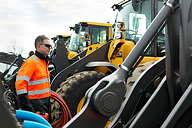Your Daily Maintenance Checks to Prevent Vehicle Fire
Nobody expects a fire on-board their equipment; however when a fire hits the results can be catastrophic. Expensive repair bills, costly downtime and a delay in production all affect your bottom line and in the worst cases, it endangers lives.
The best way to protect your people and vehicles is to prevent fire altogether. At Ardent, we strongly recommend our customers to perform daily maintenance checks to help reduce the risk of equipment fire.
Regular Cleaning
Keeping equipment clean both internally and externally is vital in aiding the prevention of fire. Not only does it maintain the integrity of the vehicle, it also prevents the build-up of combustible materials which can restrict airflow and add fuel to the fire. Schedule cleaning for the end of the work shift when heat build-up may occur following the engine shut down. Depending on the vehicle, you could choose to use high pressure water or steam to clean your equipment; alternatively, you could use a high-volume deluge hose which will not only clean your equipment but also reduce the level of spray-back in the engine. Don’t forget to clean the machine of all combustible debris – dry vegetation, coal dust, etc. – and remove any oil and fuel drippings.
Care should be taken if jet washing any electrical apparatus, or in and around an engine compartment. If steam cleaning, ensure that the fire detection circuits of the fire suppression system are not subjected to direct heat.
Inspect the Primary Ignition Points
As part of the fire suppression system specification process, Ardent completes a thorough hazard analysis which identifies the key areas of the equipment that are at risk of fire. By regularly monitoring these areas, you can identify potential problems before a fire occurs. Check that the oil, hydraulic fluid and fuel lines are all adequately separated from any hot turbo chargers, exhaust manifolds or engine blocks.
Check for Wear and Tear
Wear and tear is common when it comes to hard-working machinery and therefore it should be regularly monitored. Any signs of damage; especially to the oil, hydraulic fluid, gas or electrical lines should be swiftly repaired or replaced.
Tighten Loose Connections
Inspect all oil, hydraulic fluid and fuel line fittings as well as electrical cables and connections for tightness, clean off all residue and tighten any loose connections.
Check the Braking System
Brakes are considered a fire hazard because if they remain partially engaged, operators can continue to use the vehicle for a prolonged period, which can cause friction resulting in overheating and possibly fire. Check the braking system for proper adjustment, especially if the brakes overheat when not engaged.
Ardent Fire Suppression Systems for 24/7 protection
Good maintenance practices can help reduce the chances of a fire, but accidents still happen and the risk of fire cannot be eliminated. Fire suppression systems are designed to protect the equipment and operator if a fire occurs. However, not all systems on the market provide the same level of protection and reliability. Fire suppression success rates strongly depend on the right system specification for the specific machine and environment which considers all fire hazards in the vehicle, including those located outside the engine compartment.
For further information and advice on mobile equipment fire protection, please call us on +44 (0)1423 326740.
Related News

Q&A with Brendon Rogers
Meet Brendon, our experienced Field Engineer.

What Makes For a Trouble-Free Fire Suppression System?
How can installation standards save money in the long term?

Fire Suppression Basics: Extinguishing Agents
We start this blog series with the essential component of any fire suppression system, the extinguishing agent.
